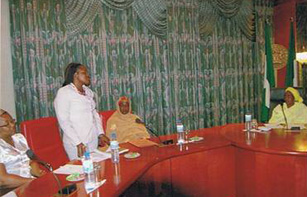
Lucy (standing) addresses the former First Lady of Nigeria Mrs. Turai Yar Adua during an advocacy visit by the Nigeria Task Team on prevention of mother-to-child transmission of HIV.
Lucy Attah has high hopes for this week’s Millennium Development Goals (MDGs) Summit. As a woman living with HIV and a gender activist from Nigeria, she believes the summit is an important opportunity to discuss issues of women’s equality and empowerment as well as achieving universal access to HIV services. Participating the summit means that she can share her experiences of helping to strengthen the AIDS response in her country.
As Executive Director of Women and Children of Hope (WCH), a Nigerian NGO, Ms Attah works to raise awareness about HIV. WCH also helps women living with the virus provide for their own material, physical and psychological well-being.
Ms Attah is member of a delegation of 13 representing networks of women living with HIV from all regions of the world. The delegation’ activities are part of a UNDP-supported global advocacy and capacity building initiative, which seeks to increase the visibility and voice of women living with HIV in the assessment of country progress toward achieving the MDGs and universal access. The initiative is also a component of the UNAIDS Agenda for Accelerated Country Action for Women, Girls, Gender Equality and HIV.
“Attending the summit is an opportunity for me to share the lessons and challenges of women’s empowerment and emancipation in our communities with the outside world.” says Ms Attah. “I will also use the lessons learned from success stories and best practices in other countries.”
WCH was formed by Ms Attah after testing positive for HIV in 1998. She was determined to address the prevailing stigma and discrimination which made her own life extremely difficult and which are still major barriers to the HIV response in the country.
Significant progress has been made in reducing HIV prevalence in Nigeria. However, with more than 3% of adults—an estimated 2.6 million—living with the virus, only South Africa has a higher total number of people living with HIV. Women often bear the brunt of the epidemic and represent more than half of people living with HIV, 1.4 million women.
There are many reasons for women’s increased vulnerability to HIV infection. Significant gender inequalities exist and women often find it difficult to protect themselves from HIV, particularly when they lack decision-making power. Levels of sexual violence are considered high and early marriage is common. Women tend to lack economic independence and those living in poverty often engage in sex work to make ends meet.
Despite these obstacles Ms Attah is optimistic about attaining the MDGs.
“We still have some way to go but we can do it if women become more involved in public policy and decision-making, more economically empowered and better educated," she said. “And if there is stronger legislation against the abuse of women’s rights and gender-based violence. Our goals are ambitious but we can get there.”




